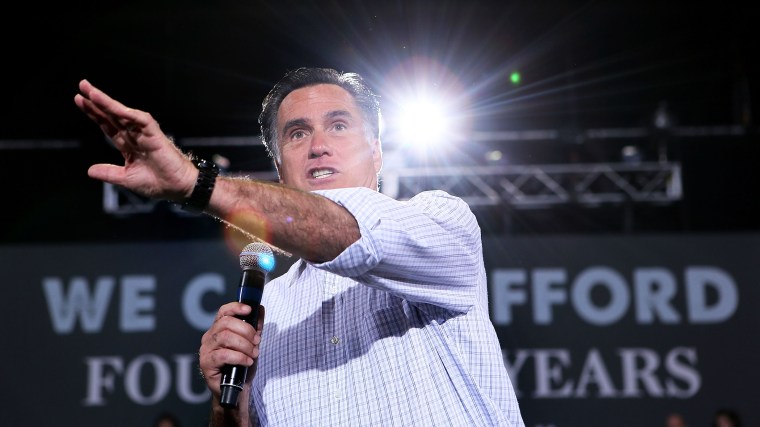I continue to watch Mitt Romney move closer to a third presidential campaign with a degree of disbelief. Obviously, I can see the reports as clearly as anyone else, but I keep stumbling on the same questions. Is this really happening? Is Romney pulling some kind of prank? Will I really have to re-start the "Mitt's Mendacity" franchise?
But more important than my own incredulity, of course, is the rationales Team Mitt has shared recently to justify his burgeoning candidacy.
Here's one of my favorites:
"They have not done a lot to flush out the details of his candidacy," said Tom Rath, a senior adviser to Romney in both his 2008 and 2012 campaigns, speaking of Bush. "His time as governor was quite a while ago."
Jeb Bush and Mitt Romney both left public office in 2002. If Bush's "time as governor was quite a while ago," and that's a bad thing, Romney has the exact same problem. The only difference between them on this score is that Bush was a fairly popular governor who won two terms and Romney was an unpopular governor who quit after one term, fearing a re-election defeat.
"You saw what they did to me with Bain [Capital]," [Romney] has said, referring to the devastating attacks that his Republican rivals and President Barack Obama's team launched against him for his time in private equity, according to three sources familiar with the line. "What do you think they'll do to [Jeb Bush] over Barclays?"
This is amazing, even for Romney. Jeb Bush has
a controversial record in the private sector, which Romney believes will be devastating. As proof, Romney reportedly points to the brutal criticisms from Democrats of Romney's private sector background.
Of course, by this reasoning, doesn't it suggest Republicans need a candidate who is neither Bush nor Romney?
His argument to his former supporters, says one who spoke with him, is that he came very close in the last election against an incumbent president with a good economy.
Except, as we
discussed yesterday, Romney really didn't come "very close" at all.
And finally, there's
this gem, responding to the argument that Romney has already run two failed presidential campaigns.
"If that's the case, then Ronald Reagan never would have become president," said Eric Fehrnstrom, Mr. Romney's longtime spokesman. "Reagan ran three times. Mitt learns from experience."
It's probably worth noting that Reagan's first national bid, in 1968, wasn't much of a campaign. He'd only been elected governor in 1966 -- his only experience in public office at the time -- and Reagan's only primary victory came in his home state. He ran, but not with the expectation that he'd actually win the nomination, which makes it far different than Romney's 2008 campaign.
And while Romney was basically a full-time presidential candidate from 2009 to 2012, Reagan actually went back to work in California, becoming a popular two-term governor. He ran again eight years after his first bid, not four, and very nearly prevailed in a tough primary over an incumbent Republican president. Reagan did not win his party's nomination in 1976 -- unlike Romney, who did.
The comparison, in other words, is a real stretch.
What we're left with is a candidate and his allies searching for a rationale to explain why Romney should try once again, and at least for now, they haven't come up with much.
